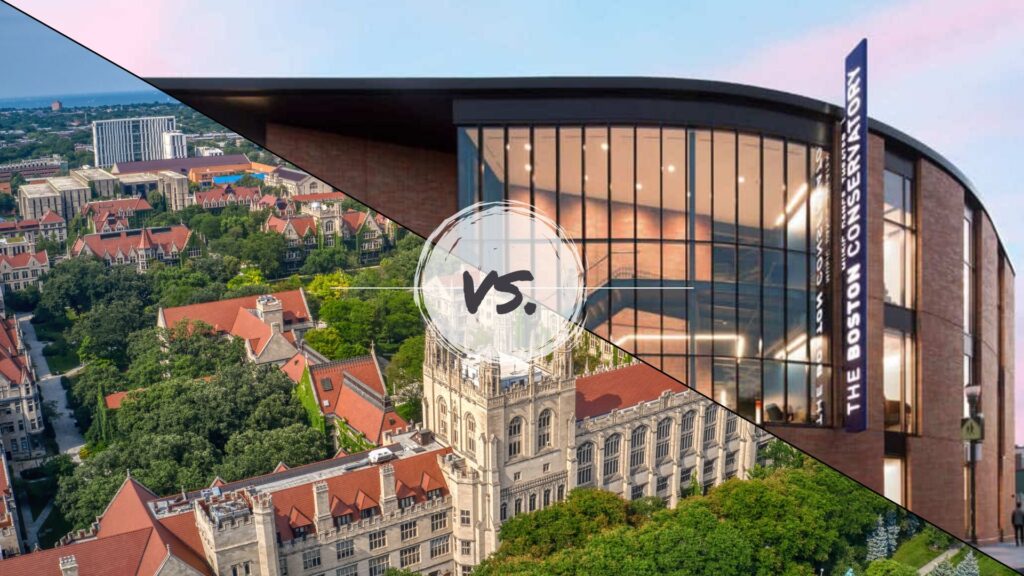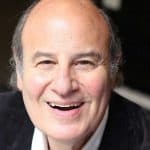CONTRIBUTIONS FROM: KAREN KERR, STEVE LIPMAN & MARK SMALL
As a young music student, you may be seriously debating which schools to apply to during the college search process. It can be confusing to determine how much the reputation of a school matters and even which type of school is best for you. You’ve likely come across two major types of music schools: conservatories and schools of music that are part of a larger university. Do you ever wonder what the differences or similarities are between the two? How do you know which one might be right for you? And does it really make a difference?

Understanding Music Institute Options
Among the primary considerations for those seeking to earn a music degree is determining the type and size of the school that will enable you to meet your goals. Depending on the major and genre of music you want to pursue, you’ll likely be choosing between a music conservatory, a small liberal arts college, or a large university. The academic opportunities and student experience are different at each type of music institution.
Today, music schools of all descriptions offer a broader range of majors and minors than in past decades. Even a classical conservatory like Juilliard now has a jazz program. Oberlin, another top music conservatory with classical and jazz bona fides, also offers courses in the recording arts and production. Small liberal arts colleges may serve up a mix of traditional classical, jazz, and popular studies as well as a concentration in music business. A large university offers a big academic tent in which the university’s school of music may have all of the above while residing alongside separate schools of business, engineering, law, medicine, and so forth.
What’s the Best Fit?
If you are wondering: “Should I study music at a university?”, the resources at large institutions—for example, the University of Southern California or New York University—are vast. The music schools within both offer degrees in performance, composition, music technology, screen scoring, music business, music education, and much more. Being located in Los Angeles, America’s entertainment capital, USC’s faculty members and visiting artists are among the most celebrated professionals in every quarter of the industry. NYU’s faculty is equally extraordinary, and the university is also located in an industry hotspot.
USC has more than 46,000 students and NYU, 58,000. At a university with a population approaching that of a mid-sized American town, living among a large cohort offers social interactions with those from other backgrounds, academic disciplines, and cultures. Additionally, USC, like the University of Michigan, is a division one school with top-notch athletic programs. This is a plus for those who want to play or those for whom attending huge sporting events or playing in a marching band is a desired part of the college experience.
Brian Head is associate dean for academic affairs at the Thornton School of Music at USC. “Here, undergraduates are immersed in a full college experience with courses that are very rich outside of your major,” he says. “You will be exposed to really smart, dynamic people in other fields among the students and faculty members. You get to see the world not only through the eyes of your music friends but your engineering and English major friends too. There are many opportunities to get involved in the academic life outside of music and there are lots of different clubs and activities.” One popular activity Head describes are the hackathons where students from all disciplines—including music—spend an entire weekend together coding and creating apps. “USC is also in a big city rather than tucked away in a remote place,” Head continues. “That’s great for students who want the opportunities a big city offers. We really lean into Los Angeles and our students can get rush tickets for the opera or shows and our campus is only 20 minutes away from the music clubs on Sunset Boulevard.”
Liberal Arts Option
For those who are more comfortable with a smaller student body and a campus with more of a small-town feeling, there are many liberal arts colleges with excellent programs and professors. Catawba College in Salisbury, NC, is a case in point. Dr. David Lee Fish is the founder and director of Catawba’s popular music program and formerly chaired the music department. “What we provide has been described as a boutique experience,” says Fish. “One illustration of that was a recent guest artist visit by a famous rock musician. He worked with only nine guitarists here. Our students got more of an intimate experience than they would have gotten at a big school. He said he had just come from a visit to a large music school where there were 1,200 guitarists.”
Catawba has a total student population of 1,300, 75 of whom are music majors. “Our department is a small community and the students look after one another,” says Fish. “It’s like an extended family. At a small institution like this, the students also get to know the faculty members well because they will take several courses from them. Another distinguishing factor of a liberal arts school is that you will earn a bachelor of arts degree. That means fewer hours in your major and more in general education courses. The liberal arts ethos is that we strive to educate the entire person. We’re not just training a musician, so our students have to take non-music classes seriously. I’m teaching songwriters and I want them to be able to write about more than love. At a school like this, they will be studying history, philosophy, the environment, and more.“
Many who choose a liberal arts college declare their major after arriving or may change majors altogether. “At Catawba, you can also blend studies,” says Fish. “We have business majors who take a minor in music business and study in our department. An important stat for Catawba is that over 90 percent of our music students stay to graduate from us.”
The Conservatory Experience
This author’s undergraduate music education took place at both Berklee College of Music and New England Conservatory of Music. Both institutions are today considered top music conservatories. In the 1970s when I entered Berklee, there were only three majors: music education, performance, and composition and arranging, and the student population was about 1,000. Berklee’s student body has now grown to nearly 7,000 on all of its campuses and the number of majors has multiplied considerably.
I entered as an electric guitar performance major interested in popular music. At the time, Berklee was the only music institution where that instrument could be your principal instrument. Many schools have since followed suit. Berklee’s core curriculum was jazz-oriented then, but readily applicable to many musical styles. I learned much about playing and writing music, and formed relationships with classmates who went on to distinguished performing, recording, and composing careers. Such interpersonal connections are a celebrated part of the Berklee experience. I found, however, that as I grew musically I wanted to dive deeper into classical music. I transferred to New England Conservatory of Music and completed my bachelor of music degree in classical guitar performance.
At NEC, I was exposed to the rich history and traditions of classical music and met entirely different types of students and faculty members among a very small and tight community of focused musicians. NEC taught music theory with a different approach from Berklee’s, rounding out my musical persona.
Today, a student who changes directions wouldn’t need to transfer to another institution since Berklee merged with Boston Conservatory several years ago. Now students enrolled at Berklee can have a traditional conservatory experience studying classical performance, composition, conducting, dance, and musical theater, and also take courses in songwriting, music business, music production and engineering, music therapy, jazz composition, film and video game scoring, music technology, and much more.
Best Music Conservatories and Universities in the U.S.
Some well-known conservatories include The Juilliard School, New England Conservatory of Music, and Berklee College of Music. Well-known music programs that are part of universities include University of Southern California Thornton School of Music, University of Michigan School of Music, Theatre and Dance, Indiana University Jacobs School of Music, and the Frost School of Music at the University of Miami.
In this blog, we’ll help clear the confusion by outlining the differences and similarities between conservatories and university music schools. Considering a liberal arts school? Learn more about a top liberal arts school for music majors and why students choose this option.
The Difference Between a Conservatory and University Music Program
The College Experience
At a conservatory, campus life generally is focused on music, music, music. While some schools will have student clubs, the majority of activity is centered around performances, concerts, rehearsals, jam sessions, and trips to the symphony; for freshmen, there may be a few outings to cultural and recreational opportunities. Some conservatories may share sports facilities/opportunities with a nearby university.
At a university, you’ll experience an environment where students have diverse interests, backgrounds, and majors. You’re likely to have access to many types of activities including, but not limited to: NCAA (or similar) college sports, intramural/club sports, Greek Life, student organizations (outside of music), dorm life – living alongside other majors, gen ed classes – taking gen eds alongside other majors.
Size
Conservatories tend to be much smaller than liberal arts colleges and certainly smaller than universities, with anywhere from 500 – 1000 full-time students. That may include undergrad students as well as graduate students. Some schools permit part-time study.
In general, universities are medium to large institutions, with some topping 30,000 students on campus and others with only 12,000. Each school is different, but overall, they tend to be larger than conservatories. Within the university, the individual schools may be much smaller, though. For example, the music school may be a small, tight-knit group of student musicians who get a conservatory-like experience with a large university’s resources. For some students, this is the best of both worlds.
Curriculum
The curriculum at a conservatory will include Core courses, courses in your major, and required liberal arts/humanities courses. Academics might make up 25% – 30% of the required 120 credits to graduate, with the remainder in music areas. The music courses will vary depending on your major. Much of your major coursework is concentrated in your 3rd and 4th years of study for a Bachelor’s degree. Students should compare the curriculum at various schools to determine which are the “best-fit” for their particular interests and career aspirations.
Depending on the type of degree you’re pursuing, you’ll be required to meet the university’s general education requirements. That means some liberal arts courses (math, English, sciences, etc.). The number of credits and requirements vary. A typical Bachelor of Music degree requires at least 120 credits, approximately ⅓ of which might be liberal arts classes. The rest of your curriculum will be music-focused. You will likely take general education classes alongside other majors at a university, and the class content might be more challenging.
Dual Major
If a double major or a minor is an option, it will likely be in music areas. However, a few conservatories might have the option of a minor in an academic area. Check carefully if that is important to you.
You are more likely to have access to options and to expand your studies at a university. The option for minors, concentrations, or double majors outside of music is possible at some institutions.
Ensembles
Ensembles are a vital part of any college music student’s experience. Whether you specialize in classical music, opera, jazz, or contemporary pop, you want to check out the number of ensembles offered and the genre and styles available to you. Also, pay attention to how many student performances there are each year.
Ensembles are included in the curriculum for virtually all music students. Options at music schools within a university are similar to what you’ll find at a conservatory and include classical, jazz, opera, and contemporary/pop. You will have requirements you must follow, and it might also be possible to select other ensembles that interest you.
Tours / Campus Visits
Tours should be arranged through the admissions office either directly or online. Confirm your exact date, time and length of tour, and where it begins. Tours may be conducted by staff or student tour guides. Remember to ask questions during your tour!
When you are ready to schedule campus visits, contact the music school. Many university tours do NOT include the music facilities or any information about what goes on in the music school. By scheduling a tour and/or meeting with an admissions representative from the music school, you can get all the information specific to your area of interest.
Application Process / Requirements
Music conservatories generally have their own application form and do not use the Common App. They might have their own essay questions as well. Be sure to follow ALL the requirements exactly as requested. Typically, depending on the program and major you are applying for, requirements might include: application form, essays, pre-screening video, official (translated) school transcripts, artistic resume, personal statement, letters of recommendation, portfolio, and live audition.
Music schools within universities will typically have additional steps and requirements in the application process that specifically relate to the university admissions review. In addition to the music requirements (pre-screening video, portfolio, live audition, etc.), you can expect to fill out an application for the university and possibly a separate one for the music schools. You will also need to submit all the university requirements, which might include transcripts, test scores (if required), letters of recommendation from a core subject teacher, essays, and an activity list, among other items.
Pre-screening Video
If requested, a pre-screening video is a representation of the student’s level of skill and repertoire. The school will detail what they wish to see and hear on the video. Provide them with exactly what they ask for: no more and no less. The pre-screening video will determine if the conservatory will invite you for a live audition or not.
Pre-screening videos are the initial step in the audition process, typically submitted at the time of application. Each school has requirements on its website, which applicants should follow. The pre-screening video will determine whether you get invited to a live audition.
Scholarships
Scholarships at conservatories are almost entirely talent or merit-based. Decisions usually involve admissions and the faculty. Much of it depends on: what instrument/voice you play, how well you play it, and how badly the school needs it. Fewer scholarships may also be offered for composition, songwriting, or other needed majors.
Most universities offer academic scholarships, and in some cases, music schools may have music scholarships. Both of these are based on merit, not need. It varies by school; for some, you can be considered for both academic and music merit scholarships, and for others, you may only be eligible for music merit.
Determining the Best Music College and College Experience for You
Most musicians are quite driven, so at conservatories as well as universities and liberal arts colleges, you’ll find an energetic and competitive atmosphere that represents in microcosm what the greater music industry holds in store. Think seriously about your goals and the type of music career you are aiming for as well as a suitable learning environment. Determine which situation will be most comfortable and beneficial for your personal needs as you reach for your dreams.
Close your eyes and picture your ideal school environment. Does it more closely match a conservatory or a university environment? Reflect on your learning style and career goals. When visiting campuses, come prepared with questions and an outline of what you want to see (dorms, music rooms, performance spaces). This will help you make an informed decision. Finally, consider working with an admissions consultant to help you narrow down your options and choose the best music program for you.
Knowledgeable, Experienced College Music Admissions Consultants
As former music school admissions directors, we have the inside track to guide students through each step of the admissions process, including choosing the most appropriate school and program. Our in-depth knowledge of universities, conservatories, their faculty, and music programs allows us to improve students’ probability of success. Learn more about our College Music Admissions Consulting services, or contact us today to get started on your admissions journey.
Did you find this blog helpful? Do you picture yourself in a music career? If the answer to that is a “yes”, your next step is simple. Contact insidemusicschools.com and allow our team of industry insiders to guide you toward your goal of being a professional in the music industry. Through expert counseling and real world experience, we will make sure you are prepared for the journey



